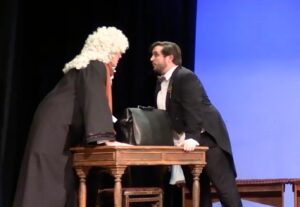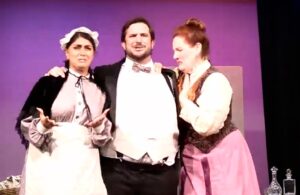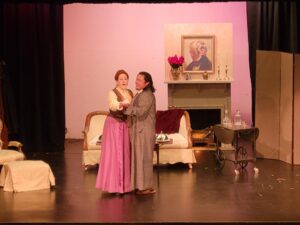Die Fledermaus
Johann Strauss II
Original German Libretto by Karl Kaffner & Richard Ginée; English Version by Donald Pippin
Pocket Opera

Everybody who is anybody of societal standing in Vienna is heading to the ball of the season at the palatial home of Prince Orlofsky. The gowned and tuxedoed guests include a man-about-town disguised as a French marquis who is skipping a date in jail in order to philander among pretty women at the ball. Arriving also are his wife masked as a Hungarian countess coming to spy on him (instead of having dinner with her lover), her chambermaid arriving as a famous actress instead of tending to her ailing aunt (a falsehood she claimed to her mistress), and the governor of the jail who thinks his prisoner is already in his cell, introducing himself as a French chevalier.
The set-up for such a host of concealed identities, the actual ball full of hilarious tete-a-tetes and romances between people who do not recognize each other, and an in-jail denouement where masks come off to reveal who has been made a fool by whom are all a part of Johann Strauss II’s 1874-premiering operetta, Die Fledermaus. Sometimes called The Revenge of the Bat, Die Fledermaus is a laugh-out-loud farce brimming with light-hearted, toe-tapping, and oft-familiar-and-hummable music that is at the same time glorious and uplifting. With an English libretto translated by the company’s founder, Donald Pippin, Pocket Opera presents at the Mountain View Center for the Performing Arts a wonderfully sung, delightfully performed, and always fun-packed Die Fledermaus with a talented cast of thirteen and an accomplished orchestra of eleven under the musical direction of Paul Dab.

With vibrant tenor vocals, Patrick Hagen plays the Viennese man of some wealth, Eisenstein, who is about to be sent to jail for eight days for insulting a local official – a sentence due to the incompetence of his lawyer, Blind. The two quarrel in a vocal duel sung with fervor and mutual notes of indignation, capped by Eric Mellum as Blind hilariously but resplendently singing an almost never-ending list of his lawyer attributes first in rhymed gerunds (“early rising, organizing, analyzing, summarizing,” etc.) and then in a follow-up list of like-rhyming adjectives (“celebrated, cultivated … not outdated, animated”) – all highlighting the skill and tongue-in-cheek prowess of Donald Pippin’s libretto, English translation.
As Eisenstein prepares for the inevitable exit to jail, his best friend, Dr. Falke, arrives to cheer him up, recalling in detail how Eisenstein played an embarrassing practical joke on the doctor three years prior. The doctor now persuades Eisenstein to delay his jailtime by one evening and to come with him to the Prince’s night of revelry, disguising himself as a visiting French Marquis. As Dr. Falke, Liam Daley calls on his rich, full-sounding baritone voice as well as perky moves of tippy toes and bumping hips to tempt his hesitant friend to play jail hooky. Eisenstein adds his wonderfully edged and air-piercing tenor notes as the pair become two dandies plotting a forbidden escapade of wine and women. As they harmonize practicing their French-sounding “oo-lah-lahs” while dancing in twirls and skips, in walks a surprised Rosalinde, Eisenstein’s wife, who is told that the doctor has only been trying to cheer up the poor, soon-to-be-jailed Eisenstein.

In the meantime, Rosalinde has already been somewhat pleasantly surprised by the visit of a former lover and music teacher, an over-sexed and pawing Alfred (Kevin Gino), who has sent to her window floating notes of his attractive and seductive tenor voice to entice and woo her for an evening’s secret rendezvous. So that the house can be empty for a one-night reunion with Alfred once her husband is in jail, Rosalinde now decides to give her chambermaid, Adele, a night off – a request under obvious false pretenses for reasons the mistress would never believe since the maid herself is off to the Prince’s ball. The two join Eisenstein in a fabulously funny trio full of musical melodrama and mocked sadness by all of “How sad am I to say goodbye,” when in fact each is full of excited anticipation of a night of secretive, forbidden revelry.
 With the husband gone, Alfred returns as Kevin Gino impressively employs his taunting tenor notes with their sustaining, vibrating pleas full of seduction to lure Rosalinde. The two dance in a waltz that becomes faster and faster as they also imbibe in more and more champagne. But when the governor of the jail, Frank, arrives to arrest the now-absent Eisenstein, Alfred the lover (already in the dressing gown of the cuckolded husband), becomes the husband in order not to embarrass the cheating wife in front of the official.
With the husband gone, Alfred returns as Kevin Gino impressively employs his taunting tenor notes with their sustaining, vibrating pleas full of seduction to lure Rosalinde. The two dance in a waltz that becomes faster and faster as they also imbibe in more and more champagne. But when the governor of the jail, Frank, arrives to arrest the now-absent Eisenstein, Alfred the lover (already in the dressing gown of the cuckolded husband), becomes the husband in order not to embarrass the cheating wife in front of the official.
Jonathan Spencer as Frank now adds his own comic flair and voice full of perk and punch as the three enact a scene of high drama, higher comedy departure of Alfred being hauled off to jail as the husband he is not. The scene is just one more of many so well directed to mine many laughs by Stage Director Madeline Abel-Kerns – scenes often that have the antics of a 1950s, TV sitcom but are performed while the comedians are also singing with vim and vigor the demands of Strauss.
The jailer who arrived to take the supposed Eisenstein to jail is actually already dressed in his formal attire since he too is heading to the Prince’s ball, touting himself as a titled French knight.
At the ball, those we have already met now have ample opportunities to continue to amuse us in their various disguised roles. Some totally do not recognize each other (like jailer and intended prisoner who become best friends at the ball). Others are frightened they will be recognized (like Adele who is shocked to see her master there). Still others recognize everyone but stay completely incognito (like Rosalinde as a masked and mysterious Countess from Hungary or Dr. Faulke who seems to know a lot more about everyone than he is letting on).

All are welcomed to the ball by the royal host, Prince Orlofsky, played in “trouser role” by mezzo-soprano Leandra Ramm, who generously uses exaggerated consonants and rolled r’s as she sings through purposively protruding, pursed lips. Her statuesque but diminutive presence marches around the ballroom in mocked, military fashion, adding one more, welcomed aspect of farce and fun. Vocally, however, the Prince does not quite match the impressive qualities of the other principles, sometimes appearing to use too much guttural and back-throated tones.
The ballroom hilarity is counter-posed with some of the operetta’s most impressive singing. Eisenstein croons with lilting tenor notes that first float easily and then jump dramatically and accurately to their intended heights as he sings “What a beauty” to court the Hungarian Countess, who unknown to him, is actually his wife. For her part, Rosalinde (Cheryl Cain) sings magnificently with powerful and playful clarity as she joins in duet with the seducing Marquis (whom she knows is her philandering husband) who is trying to unmask her. The two sing in swirling countermelodies as they also enact a scene nearing slapstick.
But it is the unlikely Adele who steals the show as Melissa Sondhi time and again sings with a voice that is nothing short of wowing. Particularly distinctive is Adele’s aria in the Act Two ballroom when she attacks Eisenstein (whom she recognizes as her boss in his false role as Marquis) who has accused her of being his wife’s chambermaid. In her now-assumed role as a famous actress and a millionnaire’s daughter named Olga, Adele beautifully ascends and descends multiple scales of notes that twirl, spin, and then sustain in carefully placed reverberations to both emphasize her indignity of his accusation and to convince everyone else of her dignity. There is no wonder that in the afternoon’s final bows, the loudest applause of appreciation dutifully goes to the chambermaid, Adele.
Once the evening at the ball ends with morning’s chimes of 6 a.m., equally inebriated jailer and prisoner each rush to the house of iron-barred cells; and for varying reasons to be revealed later, so does everyone else. The Pocket Opera cast and director continue to find more ways to capitalize through both well-sung numbers and comic romps and frolics the material both Johann Strauss II and translator Donald Pippin have so generously given them. The result is an ending of surprise revelations and a Die Fledermaus for us as lucky audience thoroughly to relish and enjoy.
Rating: 4 E
Die Fledermaus continues for one last performance on April 2, 2023, in performance by Pocket Opera at the Legion of Honor Museum, San Francisco, 100 34th Avenue, San Francisco. Tickets are available online at https://pocketopera.org .
Photo Credits: Pocket Opera

Leave a Reply